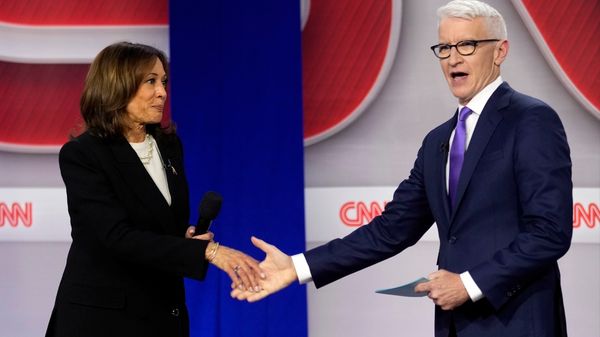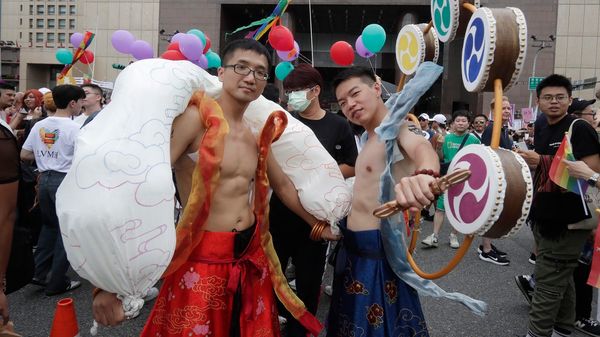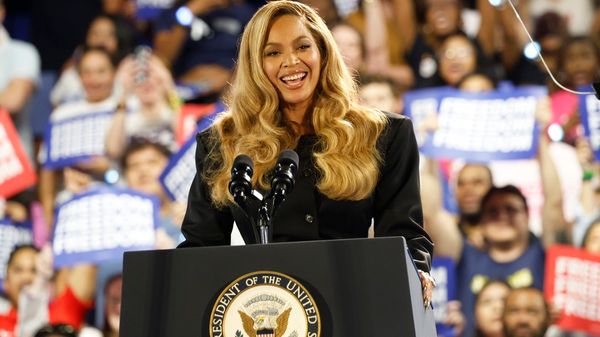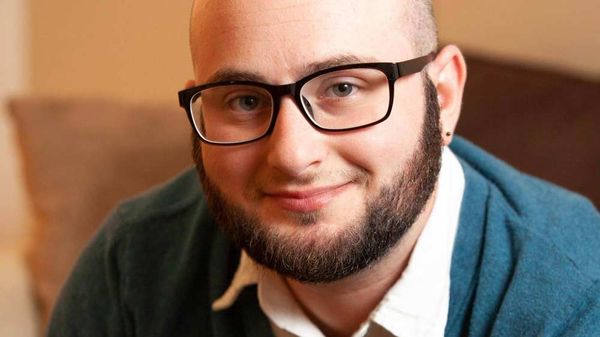May 10, 2007
Courting equality
David Foucher READ TIME: 11 MIN.
When Pat Gozemba and her spouse Karen Kahn were forced to raise funds to defray publication costs of their book Courting Equality, a moving history of same-sex marriage in Massachusetts, a marriage equality activist working on their behalf approached all of the major LGBT and LGBT-friendly organizations in the Boston area - among them the ACLU of Massachusetts (ACLUM) - and asked for financial assistance. "And the only one that came through for us was the ACLU," said Gozemba, who declined to name either the activists or the organizations that were solicited. "So needless to say we're in love with them."
ACLUM is one of four benefactors whose generosity insured that the hundreds of photos - taken by photojournalist Marilyn Humphries, a longtime Bay Windows contributor - that feature prominently in Courting Equality would be printed in color when appropriate without making the book's sale price prohibitive to consumers.
"We were so pleased to have an opportunity to really help," said ACLUM Executive Director Carol Rose. "I think Marilyn and Pat have done a wonderful job of illustrating, as part of our public education effort ... literally the human face of equal marriage stuff and I'm really proud that the ACLU has helped to sponsor their book." ACLUM's contribution to Courting Equality came courtesy of some of the organization's private donors, said Rose. (The ACLUM is cosponsoring the public launch of Courting Equality May 16. See "Meet The Authors," page 15.)
ACLUM's commitment to Courting Equality is but one example of the pivotal behind-the-scenes role the organization has played in the struggle to achieve and preserve marriage equality in Massachusetts. It's a commitment that stretches back to the 1990s, when ACLUM lobbyist Norma Shapiro represented the organization in what was known as the "Group of Groups," an informal coalition of LGBT and allied organizations that was planning, strategizing and negotiating to advance the cause of legal recognition for same-sex couples in the state legislature. Initially the Groups' focus was domestic partnership legislation; in the early 2000s it shifted to civil unions. Along the way, they also fended off attempts to pass DOMA legislation. Most notably, they helped coordinate the strategy in which legislators, led by then-Senate President Tom Birmingham, killed the anti-gay constitutional amendment via parliamentary maneuvering at a 2002 constitutional convention.
"All the things that we did ... were not marriage but were sort of preparatory to teaching people about gay couples and their issues and the problems with not having the rights that marriage conveys," recalls Shapiro, who had been lobbying LGBT issues on Beacon Hill since she began working for ACLUM in 1989. "But we didn't begin by talking about marriage, we began by introducing the notion of gay families, which - that was a surprise to a lot of people." Shapiro was still there in 2001, when the ACLU was among the 13 founding organizations of MassEquality, which at the time was a registered ballot question committee to defend against an anti-gay marriage constitutional amendment sponsored by the group Mass. Citizens for Marriage. The newly formed coalition's steering committee and subcommittees held their meetings at ACLUM's Boston headquarters.
ACLUM board member Holly Gunner joined the effort soon after, volunteering hours chairing the coalition's communications committee, lobbying legislators, rounding up critical anti-amendment testimony - most memorably that of three Catholic priests - for a legislative hearing, and website development, among other tasks. "Holly has been willing to play just about every and any role we've ever asked her to," said Arline Isaacson, co-chair of the Massachusetts Gay and Lesbian Political Caucus, which has worked closely with the ACLU as part of the MassEquality coalition and for many years previously lobbying LGBT issues on Beacon Hill. "She wore more hats in the early days of MassEquality - she was the head of this committee and the head of that committee. She's just a really good strategic thinker."
Post-Goodridge, ACLUM continued to be a key decision-maker as the MassEquality coalition beefed up its operations in preparation for the battle to preserve the Supreme Judicial Court's November 2003 decision mandating marriage equality. Shapiro and Gunner sat on a MassEquality executive committee that made the decision later that year to hire the coalition's first paid staff member, former Campaign Coordinator Marty Rouse. Back before MassEquality moved into its own Beacon Hill headquarters, Rouse was briefly housed at ACLUM's offices before he set up shop at the headquarters of Gay and Lesbian Advocates and Defenders (GLAD). Both Shapiro and Gunner are members of MassEquality's Strategic Operations Committee, the coalition's strategizing hub; Gunner continues to represent ACLUM on MassEquality's board of directors.
Going even deeper behind the scenes, in recent years, staff attorney Sarah Wunsch has advised MassEquality canvassers who have been threatened with arrest while collecting pro-equality postcards door-to-door. "The police departments would say to them, 'You have to register with us before you can do that, you're not allowed to go around door to door.' We intervened in ... three or four cities and towns to say to the police, 'You can't do that,'" Wunsch recalled. "It made it much more possible for [canvassers] to go around without being threatened with arrest."
Last year, Quincy officials relented in an effort to prevent the city's United First Parish Church from hanging a pro-equality banner on its fa?ade, after Wunsch and ACLUM cooperating attorney Elizabeth Pyle intervened on the church's behalf.
ACLUM's involvement in the marriage issue shouldn't come as news to those familiar with the organization's mission and history, both nationally and locally. The national ACLU was founded in 1920 with the goal of defending, among other guarantees in the U.S. Constitution's Bill of Rights, the right to free speech and association, the separation of church and state, equal protection under the law and the right to privacy - all pivotal principles in the long struggle for LGBT equality. In 1936, 18 years before the Mattachine Society became the first gay organization to exist in the U.S., the ACLU tackled its first gay-related case: the banning of a production of Lillian Hellman's The Children's Hour from a Boston stage because of its lesbian content. The ACLU represented the show's producer in an unsuccessful federal court challenge to the ban. In 1972, one year before Lambda Legal became the first national LGBT-specific legal advocacy organization, the ACLU filed suit on behalf of a gay couple in Minnesota who were denied a marriage license. In 1975, three years before the advent of GLAD - the organization that litigated Goodridge - the ACLU in a publication titled The Rights of Gay People gave a thorough accounting of the rights alternately available to and denied same-sex couples under the law, as well as the arguments for and against same-sex marriage. (The book also delved into other issues that LGBT activists have only begun to address in recent years, i.e. chapters on "Problems of Immigration and Naturalization," and "The Rights of Transvestites and Transsexuals").
The ACLU's Massachusetts affiliate, at the time known as the Civil Liberties Union of Massachusetts, or CLUM, was also founded in 1920; it is the oldest ACLU affiliate in the country. And like its parent organization, ACLUM broke ground on a number of local LGBT issues. In an early challenge to the U.S. military's ban on gay service members, ACLUM in 1974 represented two local women who were discharged from the service because they were lesbians. Shapiro has lobbied on a number of LGBT issues over the years, from the gay rights bill in 1989 to the successful battles to make the state's hate crime law gay inclusive and to ensure the right to privacy in HIV/AIDS testing in the 1990s. In 1986, ACLUM and GLAD together brought a discrimination suit against the state on behalf of Donald Babets and David Jean, a gay couple who were forced by the Dukakis administration to give up two foster children that had been placed in their care by DSS after their Roxbury neighbors complained. A judge sided with Babets and Jean leading the state to rescind its anti-gay foster care policy.
It was against that backdrop that the ACLU committed itself to the marriage battle.
"In many ways the whole marriage battle goes way back to the 1970s and so to the extent that the ACLU was the only organization around during a lot of that time, none of this would be happening if it weren't for the ACLU of Massachusetts and the ACLU nationwide," said Rose. Rose is quick to credit GLAD for the Goodridge decision but expressed pride in the related litigation ACLUM has done since then, most significantly its defense of the Lexington Public Schools. (Last year, Wunsch successfully argued in federal court on behalf of the Lexington schools after the schools were sued by the parents of two grade-schoolers looking to curb classroom discussions about LGBT families.) "That's very much going to be an important test case as we go forward insofar as I think a lot of people who are opposed to giving equal rights to LGBT families in Massachusetts would like to say, 'Gee folks, you give them this, the next thing you know they're going to go after your children,'" said Rose. "That's the threat that's behind those kind of lawsuits and that's why it's so important to knock them down."
ACLUM plays a unique role in the marriage equality movement because as a multi-issue organization it brings a big-picture focus to the issue of LGBT equality. "We are an organization that brings together the issues of why equal rights for LGBT families are related to equal rights for families of color, are related to the equal rights of poor people and rich people; all of our rights are together," says Rose. "We are a mainstream organization that's about the Bill of Rights and the [Massachusetts Constitution's] Declaration of Rights and brings that to bear in the legislature in a way that's important." Rose also points out that the organization has worked to mobilize its statewide membership on the issue.
But Rose is especially emphatic about the importance of putting Shapiro - "one of our most important weapons" - on MassEquality's Strategic Operations Committee. Shapiro's admirers says that she will patiently revisit an issue with legislators, working them until the 11th hour until they come her way on a vote. "She has consistently managed to persuade innumerable legislators to see things our way because she is so willing to keep trying, to not take no for an answer, to not simply give up because it's a difficult vote to try and turn," said Isaacson.
Isaacson said that the longstanding relationships Shapiro forged with legislators while lobbying other issues for ACLUM - working to defeat death penalty legislation for example - have proven invaluable to marriage equality activists. "A lot of Catholic legislators followed the Church in opposing the death penalty," Isaacson observed. "So when Catholics were against us on marriage, she could walk right into their rooms and she could bond immediately because they had already bonded over fighting the death penalty." It was an "immediate connection" said Isaacson, "that she could then work to our advantage. And she did."
Shapiro acknowledged that her pre-existing relationships with many legislators have enabled her to converse with them in a way that members of the LGBT community perhaps could not. Additionally, her lobbying efforts on other causes near and dear to ACLUM, including hot-button social issues like reproductive choice and the death penalty, have given Shapiro a perspective that enabled her to remain calm even during the most tense moments of the marriage debate. "It's because I'm one of the wizened elders," Shapiro laughs. "I've seen this before ... and I long ago had figured out what the principles are that I'm working for and I feel very convinced that those principles are right and that they will eventually prevail. So I just keep going."
The arrival of Christopher Ott as ACLUM's communications and web manager earlier this year further strengthens the organization's marriage equality resources. Ott is the former executive director of Action Wisconsin, the organization that headed up efforts last year to defeat the state's anti-gay marriage amendment. Feeling less than welcome as a gay man following the amendment's passage by a wider margin than expected last November, Ott leaped at the chance to take a job with ACLUM. Rose said Ott's experience running a statewide ballot campaign factored into his hiring. "We want people who've been through one of these things so that if in fact Massachusetts is faced with that kind of a campaign that we have somebody who's been through the ringer and knows the ropes and understands that his role as a communications person for the ACLU is [as] part of a larger movement here in Massachusetts to ensure that we have a public education campaign." Ott has already collaborated with MassEquality on the MassEquality-produced DVD "Better Angels," in which he discusses the impact of the Wisconsin ballot initiative campaign. The DVD has been distributed to state lawmakers, who will soon be voting for the second and last time on whether to advance the amendment to the 2008 general election ballot.
In a post- 9/11 world of immigration crackdowns, illegal imprisonment, racial profiling and government snooping has ACLUM taken any heat from its members about the amount of resources it has funneled toward the marriage battle? Rose conceded that she's fielded calls from angry members. But what's got them ticked off isn't the ACLUM's level of commitment to marriage equality, it's the organization's opposition to putting the issue to a popular vote. "Insofar as ballot access is a pure civil liberties issue," said Rose, "that is probably where we've gotten the most pushback from people." She's quick to add, however, that ACLUM has a clearly defined policy that states that the ballot initiative process should not be used to undermine fundamental civil rights and civil liberties and that the anti-gay marriage amendment violates that policy. "But the campaign of the easy sound bite, of 'Let the people vote,' has been one that we've had to really work to educate our membership and the public about," said Rose. "And we will continue to do so because it is an important point that members of the legislature need to understand as well. So our public advocacy and education work really lies around making people understand that saying 'Let the people vote' is not a fundamental principle that should be applied to taking away fundamental constitutional rights.
----------
Meet the authors
What better way to celebrate the third anniversary of the first legal same-sex marriages in U.S. history than at the release party for Courting Equality (Beacon Press), perhaps the most vivid rendering of the struggle to achieve and maintain marriage equality in Massachusetts - and more importantly perhaps, the profound impact it has had on LGBT couples and families - that will ever be put between hard covers.
Courting Equality was authored by Pat Gozemba, co-chair of The History Project, and her spouse Karen Kahn, and illustrated with page upon glossy page of photos by Marilyn Humphries, a longtime Bay Windows contributor who has spent decades documenting the life of the local LGBT community. It's required reading both for the thousands of revelers who celebrated the betrothed at Cambridge City Hall on May 17, 2004, when "the city block rocked with cheers at 12:01," as Gozemba and Khan note, and those fair-minded folks who may still be uncomfortable with the idea of same-sex marriage.
For progressive activists Gozemba explains, Courting Equality serves to validate "what we have done to preserve equality for all people. We want progressives to see that and be proud of what their achievements have been and to bolster us as we go ahead to continue the struggle." As for those less inclined to support equality, Gozemba hopes that they'll see the book "and they'll look at what the issues are, they'll look at the political struggle and they'll also look at the families, in particular, and see how critical this is to people" across the "whole spectrum of life," from young couples with children to older folks facing their twilight years with limited resources. "People aren't really thinking about how our lives are affected along the whole spectrum of life," says Gozemba.
Gozemba, Kahn and Humphries will be signing copies at a book release party at the Cambridge YMCA from 6:30 to 8:30 p.m. on May 16. ACLUM Executive Director Carol Rose will play host for festivities that will include remarks from Mary Bonauto, the Gay and Lesbian Advocates and Defenders attorney who masterminded the Goodridge case. "It's really a celebration of the launch of the book and a kind of rededication to preserve marriage equality," Gozemba says of the event.
David Foucher is the CEO of the EDGE Media Network and Pride Labs LLC, is a member of the National Lesbian & Gay Journalist Association, and is accredited with the Online Society of Film Critics. David lives with his daughter in Dedham MA.







